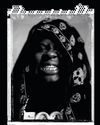Inside the undercover adventures of a full-time fraud sleuth.

IT'S A SATURDAY in a well-appointed room in a luxury hotel in a major American city and a man named Richard Overum has just escorted me from the lobby to brief me on my new identity. My directive: Embody a high roller. A man capable of signing a check for millions of dollars at a moment's notice. And, most important, a man looking to make an investment. I need to look perfect, Overum explains. Because tonight, I'll be shadowing him on a sting.
Richard Overum is not a member of law enforcement or a government official. He's something else: a rarefied practitioner in a line of work he's all but created for himself. He hunts businesspeople he suspects are breaking the law-a job that by virtue of oft-overlooked sections of federal law can end up paying remarkably well. Tucked into the Dodd-Frank Act, which Congress passed in the wake of the Bernie Madoff scandal and the economic calamity of the late noughties, are provisions meant to encourage people who spot signs of potential financial wrongdoing to come to the government with information. The incentive? If the agencies take enforcement action based on a tip resulting in sanctions in excess of $1 million, the law says, one or more whistle-blowers can earn an award equal to 10 to 30 per cent of what's collected.
Whistle-blower programmes were established at the Securities and Exchange Commission (SEC) and the Commodity Futures Trading Commission (CFTC) to manage and investigate tips, and the calculus for awards depends on multiple factors, including the value of the information in making the case. But the payouts can be enormous. Recent cases have rewarded SEC whistle-blowers with $29 million, $38 million, and $104 million. Last year, the SEC cut its biggest cheque yet, issuing a payout of $279 million to one tipster who reportedly aided in a bribery case involving the Swedish telecom Ericsson that resulted in a more-than-billion-dollar settlement.
この記事は GQ India の August - September 2024 版に掲載されています。
7 日間の Magzter GOLD 無料トライアルを開始して、何千もの厳選されたプレミアム ストーリー、9,500 以上の雑誌や新聞にアクセスしてください。
すでに購読者です ? サインイン
この記事は GQ India の August - September 2024 版に掲載されています。
7 日間の Magzter GOLD 無料トライアルを開始して、何千もの厳選されたプレミアム ストーリー、9,500 以上の雑誌や新聞にアクセスしてください。
すでに購読者です? サインイン

GQ MOST INFLUENTIAL YOUNG INDIANS
This year, GQ celebrates visionaries who aren't waiting for the future but are building it. From boardrooms to digital platforms, these young trailblazers are setting trends and turning bold ideas into movements, proving that leadership today isn't about age, but about impact, imagination and the ability to spark change—often one viral idea or revolutionary prototype at a time. These young changemakers aren't just part of the conversation. They are the conversation.

Modern Revival
Versatile enough to be a bandana, neckerchief or a chic addition to a sharply tailored suit, the humble silk scarf is seeing a resurgence.

The Omega That Bond Built
For 30 years, Omega has been 007's watch of choice. Now, with a new Seamaster, the Swiss maker is letting some of that superspy allure spill over to its main line.

Built for the Slow Burn
From FTII daydreams to streaming stardom, Jaideep Ahlawat's long, slow rise has been anything but accidental.

The Artisan Builders Of Ahmedabad
Meet the creatives tapping into Ahmedabad's design history to create its future.

A Flying Start
A new chapter for the world's most storied motorcycle manufacturer, the Flying Flea is Royal Enfield's first electric offering, and one of its only machines not specifically built for touring or B-road bashing. Will the Flying Flea soar?

GQ Top Shelf
Fashion, Grooming and Luxury in standout style

The sex checks and eccentricities of Daniel Lee's Burberry
BRITAIN IS NERVOUS. THE OUTLOOK IS GLOOMY. AND AT BURBERRY, ONE OF THE LAST GLOBAL BASTIONS OF BRITISH LUXURY, CHIEF CREATIVE OFFICER DANIEL LEE IS SEEKING TO INJECT A SENSUAL OPTIMISM INTO OUR DEEPLY ANXIOUS TIMES.

Summer Reboot
Travelling to enhance well-being is now a legitimate goal, and it is no longer limited to deep-tissue massages and meditation. It's about real, tangible transformations. From Ayurvedic detoxes in the Himalayas to icy plunges in the Arctic, our curated list of retreats offers programmes that rewire your body and mind. Whether you seek deep healing or peak performance, these luxury escapes will redefine your idea of self-care.

Bigger Than Texas
BigXthaPlug put Texas rap back on the map. Now, on the heels of a hypnotic album packed with hits, he's plotting to take his Lone Star appeal worldwide.
